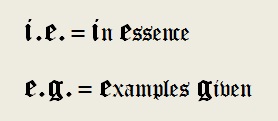 It’s amazing how much influence Latin has over the language we speak and write in every day. It’s at the root of many, many languages, and some terms have also survived intact from this centuries-old language and made it into English. But their foreign origins can make them even harder to use correctly, so quite often, people who try to use Latin in an effort to make themselves sound smarter end up doing just the opposite.
It’s amazing how much influence Latin has over the language we speak and write in every day. It’s at the root of many, many languages, and some terms have also survived intact from this centuries-old language and made it into English. But their foreign origins can make them even harder to use correctly, so quite often, people who try to use Latin in an effort to make themselves sound smarter end up doing just the opposite.
I.e, E.g., LMNOP?
The most confusing Latin terms that we still use, by far, are i.e. and e.g., which makes sense considering that they’re both two-letter abbreviations for words that we don’t use or understand on their own, and their purposes are actually somewhat similar. They both exist to clarify something you’ve just written, but in functionally different ways.
The first one, i.e., stands for “id est,” which translates to “that is.” You should use i.e. when you want to further explain the thing you just said. Think of it as meaning “in essence” or “in other words”:
The Norwegian Blue parrot was pushing up the daisies, i.e., dead.
On the other hand, e.g., which stands for “exempli gratia,” means “for example.” Use this to introduce examples given:
A good cheese shop always stocks popular varieties of cheese, e.g., cheddar, mozzarella, and Parmesan.
Remember:
Other Common Terms and Errata
- Ad Hoc: “For this,” used to indicate something quickly thrown together or improvised
- Ad Nauseam: “To the point of disgust.” If you go on ad nauseam about something, your audience will be bored.
- Alumni: Words in Latin have gender and number, so there are four different words for someone who graduated from a school. One man is an alumnus. One woman is an alumna. A group of men or both men and women are alumni. A group of women are alumnae.
- Ergo: “Therefore”
- Et Al.: “And others”
- Et Cetera: “And the rest.” Abbreviate this as “etc.” Don’t say “and etc.”: The “and” is already in there (it’s the “et”), so you’d be saying “and and the rest.”
- Mea Culpa: “My blame,” used as an admission of guilt and an apology
- Per Se: “Through itself,” by itself or in itself; inherently
- Pro Bono: “For the good,” not done to earn money
- Quid Pro Quo: “Something for something,” an agreement in which each side gives something to the other
- Sic: “So it was,” used sometimes to indicate that material is being quoted as it was originally said or written, errors included. When it’s used, it usually appears in brackets and italic.

